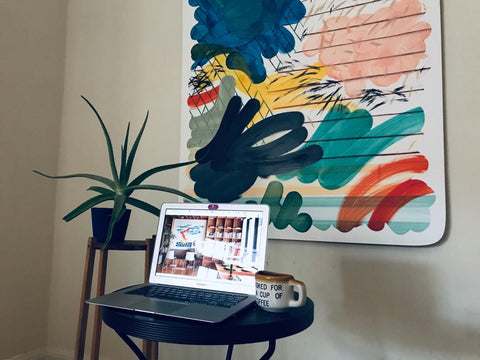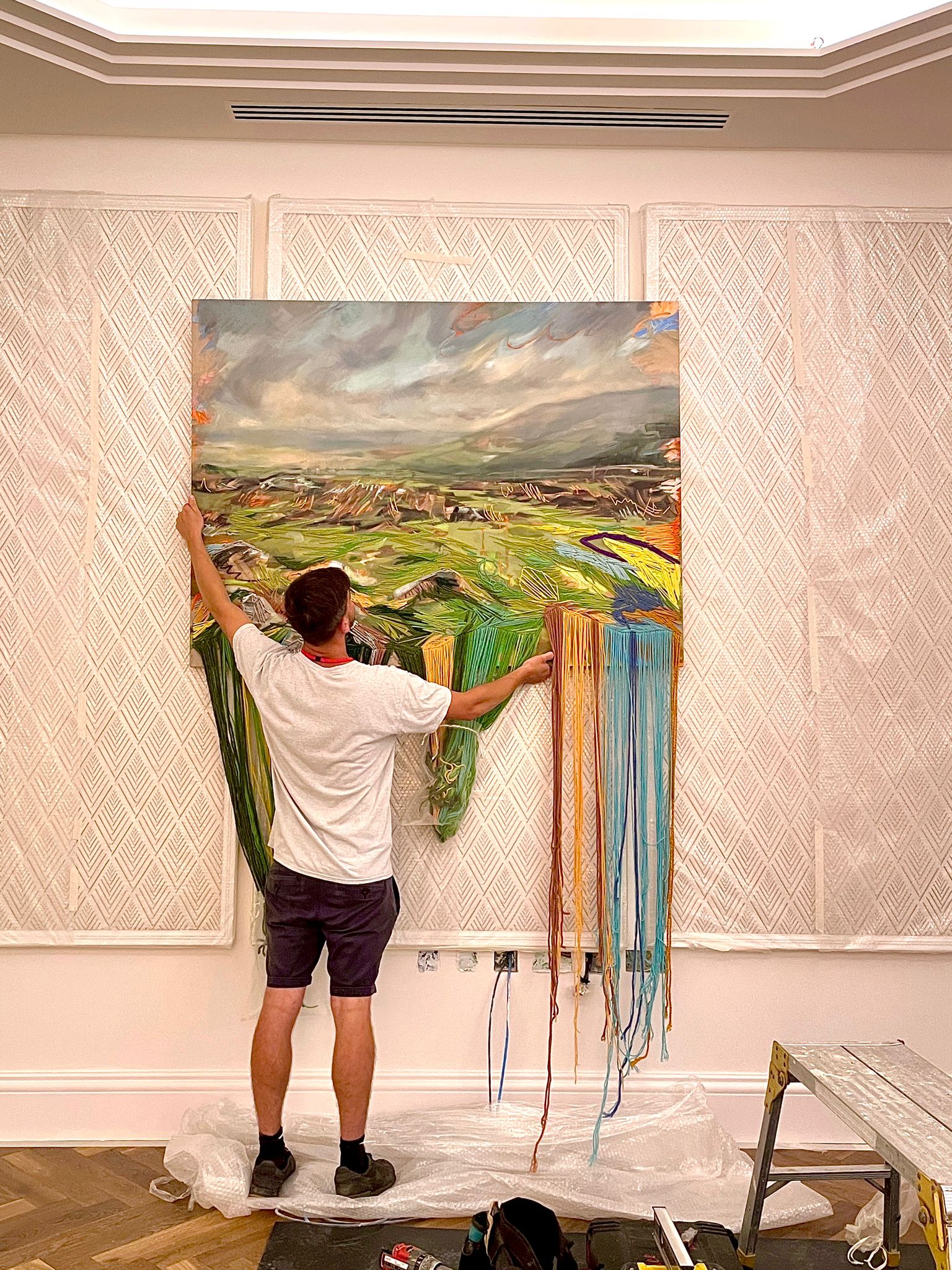Chances are, you will be working from home beginning in the next few weeks, or maybe even sooner (if you have not started to already - courtesy of COVID-19).
With so many unknowns about the status of COVID-19 and its future, many of the world's biggest companies are already making sweeping measures to ensure their employees stay safe and healthy in the face of this potential pandemic.
For some of us, working from home is not something that comes easy, and we'd prefer to be in the office. Unfortunately, this may be an unlikely option in the coming future. So how can we stay productive and healthy when working from home? We've compiled 5 thoughtful, research-backed tips to make your home environment conducive to your success.
1. Create a routine
It is incredibly important to begin working from home by creating a routine. Start with a work-out, a walk or a relaxing coffee routine perhaps? Something that gets you out of bed and to the desk in a different mindset.
Unfortunately, with COVID-19's unpredictable future, we could be working from home for a few days, weeks, or maybe months. According to Greg McKeown, author of Essentialism, "having a secure and well-thought-out routine encourages work on the essentials, allowing you to focus on these. Having a consistent routine will allow us to automate these essential tasks and prevent interruptions".

If the idea of a routine seems dull, there are a few things you can do to spice it up and make "routine" an attractive concept.
- Change it up: Have different routines for different days of the week to create variety. Changing the routine for a specific day can help you overcome the repetitiveness of "routine" and allow you to look forward to the activities of a day. Especially for those of us that look forward to events after work that might be getting cancelled. Perhaps Monday's routine focuses on a huge morning project and a long workout session, whereas Thursday is small and essential tasks with a long slow-cooked candlelit dinner. These different routines can help you focus on what matters more in the moment.
- Create a commute to sandwich your workday: Walk around the block and right back into your front door. If you prefer staying indoors, meditate for 15min or write a journal with your intentions for the day, or just take a shower and get dressed. This is an activity that will help you get into and out of work mode effectively. Here are some more suggestions from LifeHacker.
- Always do the most important thing first - Waking up and taking care of the most important items first can help fuel you for the rest of the day. Doing mindless tasks to begin the day can drag you down and make you less productive.
- Set a time to socialise - At work you probably meet your colleagues over a coffee or chat by the water cooler, these interactions are incredibly important to keep us from feeling isolated and lonely. At Curaty we actually include team catch-ups in our work from home routine. It's a video call allotted for the team to catch up and share stories as we would at work anyway.
2. Find the right space
Our immediate environment has a large impact on our creativity, productivity, and wellbeing. Simple things like artwork and colour, light, temperature, sound, and clutter, within the physical space can profoundly alter our mentality and our work. Here is Curaty's checklist to identify the right space to work from:

- Artwork and/or colour: Having artwork in your workspace with bright and soothing primary colours (yellow's, blue's, red's) and soothing textures and strokes can improve how you feel in the workspace. If your workspace lack's natural light, art can actually awaken it, making it feel happier and brighter. Our research has shown that the right artwork in the right place has proven to increase productivity by up to 32%, boost creativity, and instil feelings of wellbeing and belonging. Here's the research
- Light: Exposure to natural light in the morning and evening has been found to decrease depression and improve mood, energy, alertness and productivity. If your home doesn't allow for a spot by the window, opt for light fixtures with cooler blue-white bulbs, they mimic certain benefits of sunlight. If you are looking to invest, “blue-enriched” light bulbs that are 17,000K can actually boost work performance by supporting mental acuity, vitality and alertness while reducing fatigue and daytime sleepiness. More about lights in this research (University of North Carolina).
- Temperature: Make sure the temperature at home is between 20°C and 25°C. Within this range, Slightly warmer temperatures are good for problem-solving and creative thinking tasks, while slightly cooler temperatures have a positive impact on repetitive and task-oriented duties. If the temperature is any lower or higher, your productivity can be dramatically affected.
- Sound: Take advantage of working from home and controlling the sound. Blasting music can boost creative juices and get us pumped. Being able to "choose quiet" is equally important especially when it comes to concentrated focused work. Invest in those noise cancellation headphones. Choose a room where you can close the door. Stick post-it notes on the door to mark quite time or meeting times. If you have children, family or room-mates that keep disturbing you, break the tasks into 25 min "quiet-time" slots with 5 min breaks in between allotted to address these interruptions.
- Stay organised and clutter-free: While messy spaces can be great for creative work and brainstorming, having a stack of unpaid bills or papers from non-relevant projects on our desks can lead our minds astray and cause us to lose focus very quickly. Temporarily clear your workspace area of any unfinished project irrelevant to your goals for the day - just grab a shoebox, put those papers away, and get back to address it at the end of the workday or during breaks.
3. Align your tasks with your body's preferences
Everyone has moods and motivations that change at different points in the day. Here are a few quotes and studies to highlight this importance from Daniel Pink's book, When.
- "We are smarter, faster, dimmer, slower, more creative, and less creative in some parts of the day than others.”
- According to a study from the University of Oxford, “[T]he performance change between the daily high point and the daily low point can be equivalent to the effect on performance of drinking the legal limit of alcohol”.
- "In the mornings, during the peak, most of us excel at analytic work that requires sharpness, vigilance, and focus. Later in the day, during the recovery, most of us do better on insight work that requires less inhibition and resolve".
Working from home allows you to experiment a bit and be flexible with how you tackle the day's tasks. Try aligning what works best with your own preferences with your work, and your productivity should go way up.
4. Take smart breaks
The idea of a "break" gets thrown around all the time at the office. Yet many times, those breaks come at times when you want to keep working or perhaps don't come when you want to break. The good thing about working from home is that you can break when it is most beneficial for you. Here are some actionable tips on breaks that will help you be focused and awake:

- Try the "Pomodoro Method": a time management method developed by Francesco Cirillo in the late 1980s, that increases productivity through taking short scheduled breaks regularly. The technique uses a timer to break down work into intervals, traditionally 25 minutes in length, separated by short 5 min breaks. After three Pomodoro sets take a 30 min break. More about it here.
- Short walks outdoors even just around the block, can help you return back to the desk in a better mood and feeling refreshed. Rumour has it that Charles Darwin actually made these walks a daily ritual when writing On the Origin of Species.
-
Implement a "Tech-free break"! It is so tempting during a break to reach for your phone to scroll Instagram or an app for "leisure". Instead try just removing technology during these breaks, and see how much better you feel.
5. Prioritise your sleep

Working from home can let you set your schedule to prioritise sleep. With no travel time, you should be able to prioritise your sleep to become more productive and healthier. According to "Why We Sleep" by Matthew Walker, sleep improves cognitive functions like our ability to learn, memorise, and make logical decisions. For our health, sleep resets our emotions, restocks our immune system, fine-tunes our metabolism, and regulates our appetite. On the contrary, a lack of sleep has links to higher rates of depression, anxiety, immune system failure, stroke, heart failure, cancer, dementia, skin problems, and overeating. Here are a few simple ways to get better sleep from Walker's book:
- Exercise is great, but not too late in the day. Try to exercise at least thirty minutes on most days but not later than two to three hours before your bedtime."
- Relax before bed. Don’t over-schedule your day so that no time is left for unwinding. A relaxing activity, such as reading or listening to music, should be part of your bedtime ritual.
- Take a hot bath before bed.
- Dark bedroom, cool bedroom, gadget-free bedroom.
- Have the right sunlight exposure. Daylight is key to regulating daily sleep patterns. Try to get outside in natural sunlight for at least thirty minutes each day. If possible, wake up with the sun or use very bright lights in the morning.
- Don’t lie in bed awake.
These six tips will help ensure a more restful and restorative sleep to make you healthier and more productive. For more tips, check out Walker's book, "Why We Sleep".
Final Summary
There may be uncertainty, mixed in with a bit of panic in the world right now, but that doesn't mean we can't yet stay motivated, positive and productive! Perhaps things will blow over soon and we will be back at our desks or perhaps working from home will become synonymous with just simply working. Whatever the scenario is, this article should leave you with 5 meaningful and research-backed tips to ensure you stay healthy and productive at home. Find the space, mind your mood, take smart breaks, prioritise sleep, and create a routine. These 5 tips will help you stay on top of the game, no matter the scenario.
For more information on how to make the space around you more productive, check out our research on the effects of artwork.
Have your own work from home tips and tricks, we want to hear them! Leave a comment below.








2 comments
Work from home, I am sure will become an IN THING sooner than later.
Very well compiled & summerised.
Keep it up Sneha.
Nice suggestions and would like to implement and follow